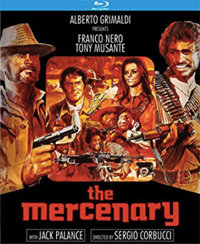 Despite his prolific contributions to the succession of the spaghetti western, time has tended to obscure the reputation of director Sergio Corbucci from all but the committed aficionados of the genre. One of the influences wrapped up in the significant pastiche of Quentin Tarantino, he is perhaps most lovingly remembered for the 1966 cult item Django, which starred Franco Nero and was obviously a major template for 2012’s Django Unchained.
Despite his prolific contributions to the succession of the spaghetti western, time has tended to obscure the reputation of director Sergio Corbucci from all but the committed aficionados of the genre. One of the influences wrapped up in the significant pastiche of Quentin Tarantino, he is perhaps most lovingly remembered for the 1966 cult item Django, which starred Franco Nero and was obviously a major template for 2012’s Django Unchained.
Corbucci’s other infamous 1966 title, Navajo Joe, remains on the losing end of the politically correct spectrum, starring Burt Reynolds as an avenging Native American, a caustic collaboration which is best remembered bitterly by its star’s dismissive attitude on the press circuit by declaring, “I got the wrong Sergio.” Reynolds, who headed off to Italy to mimic the success of Clint Eastwood’s iconic turn as The Man with No Name, inadvertently defined the shadow which would eternally overshadow Corbucci—Sergio Leone. But lurking in his filmography are varied, eclectic gems waiting to be discovered, of more various textures than Leone’s more infrequent yet iconic contributions. Directing fifteen spaghetti westerns between 1964 and 1975, Corbucci would release two of his most revered titles in 1968, including the lauded The Great Silence (which features Jean-Louis Trintignant and a phenomenally disturbed Klaus Kinski), and his second collaboration with Franco Nero, the beloved but less often explored The Mercenary.
Sergei Kowalski (Nero), a renegade Polish mercenary hiding out in Mexico during the revolution, is hired by mine owner Alfonso Garcia (Eduardo Fajardo) to smuggle his silver across the border into Texas before it is seized or stolen. But when Kowalski meets Paco Roman (Tony Musante), an affable peasant leading a group of revolutionaries, he is offered a greater fee to assist the men as a military advisor and thus absconds with the silver. In response, the cruel General Garcia (brother of the mine owner) and henchman Curly (Jack Palance) hunt down Kowalski and Paco, but are defeated by their united forces. Emboldened, Paco and Kowalski lead their men through a series of raids, getting rich off the plundering of several other Mexican silver mines. But when they liberate several captives, the pair become rivals under the manipulations of the beautiful revolutionary Columba (Giovanna Ralli), who convinces Paco a white man such as Kowalski is a capricious threat to their cause.
The Mercenary is the first chapter of Corbucci’s Mexican Revolution trilogy, followed by the celebrated Companeros (1970) and the less-well received What Am I Doing in the Middle of the Revolution? (1972), a political comedy which doesn’t feature the major returning players from the first two films. Although not as obviously unbecoming as the evident whitewashing in Navajo Joe, questionable casting tends to plague The Mercenary, with Italian star Nero stepping in as a Polish anti-hero (degradingly referred to as ‘the Polack’) and Italian-American actor Tony Musante starring as a Mexican peasant. Musante, a performer who tends to inject his characterizations with hyperbolic emotional zest (take a glance at his campy yet unforgettable moment as a gay detainee to Frank Sinatra’s kindly cop in 1968’s The Detective), approaches Paco as a gregarious force of nature, which plays well besides Nero’s smug, sobering, and self-involved central figure. Italian actress Giovanna Ralli has a rather thankless role as Columba, serving her purpose as the romantic interest utilizing her political agenda to pit the idealistic Paco against the self-serving, fair-weather friend Kowalski.
Besides a surprisingly playful score from Ennio Morricone (which was, of course, sampled by Quentin Tarantino in 2004’s Kill Bill: Volume 2), the oddest element of The Mercenary is the flagrant homosexual named Curly played by Jack Palance, who looks as if he were gunning to play Liberace. An odd element to the narrative, playing a mercenary representing the interests of the mine owner the plot tends to forget about, Curly is forced into submission by Paco and Kowalski during a deadly encounter. As the bandits degrade Curly by calling him ugly, Kowalski declines to steal the clothes off the man’s back, suggesting no one should be punished by seeing his naked flesh. Palance quietly removes his clothing and takes off into the desert, vowing bitter vengeance (of note, Palance would win his Oscar for playing a character named Curly in 1990’s City Slickers).
Disc Review:
Kino Lorber presents The Mercenary as part of its Studio Classics brand in 2.35:1. Picture and sound quality are dependable in this transfer, especially considering previous releases of the title found Corbucci’s title lumped in on cut-rate double-feature spaghetti western releases. Optional audio commentary from director Alex Cox and the film’s original theatrical feature are the only bonus features.
Final Thoughts:
Although less cohesive than the sublime The Great Silence, there’s enough going for The Mercenary to secure its reputation as a stellar entry in the spaghetti western cycle.
Film Review ★★★½/☆☆☆☆☆
Disc Review ★★★/☆☆☆☆☆


